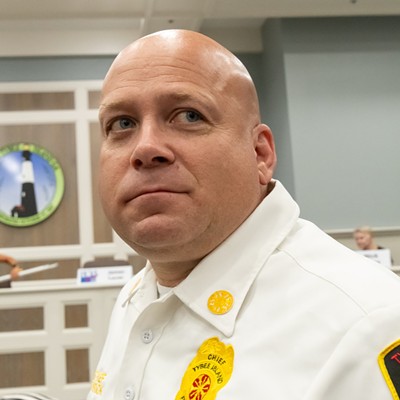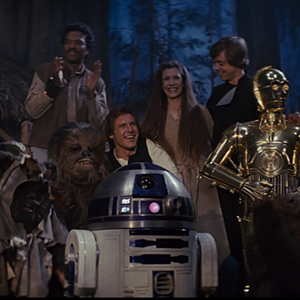While he’s running as the outsider in the race for school board president, Joe Buck does have a wealth of experience to draw on, winning numerous awards in his 38-year career at Armstrong Atlantic State University. He can also boast being the biggest vote-getter by far in the Nov. 7 election which resulted in this Tuesday’s runoff with incumbent school board president Hugh Golson.
While technically the position is nonpartisan, Buck is clearly the Republican in this race. His campaign is being run by local GOP consultant Dave Simons, and the candidate is prominently featured on mailouts from Gov. Sonny Perdue. Whether Buck can belatedly ride the coattails of Perdue’s recent reelection landslide remains to be seen, but he is clearly an electoral force to be reckoned with. We spoke to Buck last week.
Connect Savannah: This was a very crowded school board field. Why do you think that is?
Joe Buck: Two reasons, really. One is that a group came together about a year and half ago -- I was not a part of it – called the Chatham Education Coalition. It was a widely diverse group whose sole purpose was to get good candidates for the school board. They came up at meetings with a series of nonbinding but potential qualifications they’d like to see. I think that created awareness.
I mean, this past election we had 19 candidates competing for spots on the school board and for president. I’ve been in Savannah 38 years, and as far back as I can remember it was usually a situation where almost all the candidates for school board were reelected with very little competition.
The second reason -- and this is by far the most important one -- is that people are ready for a change. The whole school system being put on probation created a real wakeup call. For years I had been a Southern Association of Colleges and Schools site visitor, and one thing I learned from all that is that the last thing they’d ever do is put somebody on probation. They’ve traditionally tried as hard as they can to keep that from happening. So for SACS to put this system on probation was a really big deal.
As for me, I realized I didn’t want to retire and do nothing. I felt like I had a lot of valuable years left to serve the community. But there wasn’t really one defining moment.
Connect Savannah: Unfortunately challengers for school board president are often disappointed when they find out how little power the job actually has.
Joe Buck: It took the whole system being put on probation to bring home how really under the law, the board of education hires the superintendent and then provides that superintendent the resources. The board enacts policy and the intention is that the superintendent will carry out that policy and make it work.
This is not to say the superintendent is not key to whole system. I don’t think the board president needs to get into telling Superintendent Lockamy, you’ve got too many administrators. However, the board does have a role in seeing that the superintendent and his staff are keenly aware of the need for effectiveness and efficiency -- and sometimes those two are very different -- and to see that the money spent is spent to serve students the best way possible.
Connect Savannah: No Child Left Behind has received mixed reviews from educators around the country. What’s your view?
Joe Buck: No Child Left Behind is not a lot different from most other federal and state mandates. All of education nowadays is so heavily mandated. Usually what happens in the real world is that people must of course find ways to comply with the law, but sometimes more logically and reasonably.
No Child Left Behind calls more attention to some areas like disabled students than we have in the past. The negative side is that No Child Left Behind is heavily weighed toward grades and scores. We have to not forget it’s really all about the children. There’s not a person I know where, if they know they’re being, in essence, graded on how well their students do or company does on some kind of test, is not going to try to teach to the test. I think we’ll see some changes in No Child Left Behind, probably. And I think some of the state guidelines about education will change somewhat.
Connect Savannah: You were at the recent PTA meeting at May Howard when a lot of parents voiced their discontent. What’s your take on that situation?
Joe Buck: I know there are some strong feelings out there. I understand parents who say “I’m paying these high property taxes, why can’t my kids get more of my tax dollar?” But by virtue of it being a tax it’s just that -- a tax. Everybody pays into it for the common good.
Connect Savannah: The school board levies over half of all property taxes in the county.
Joe Buck: As far as the school board budget goes, it’s basically the biggest business in Chatham County. The school board has to be accountable to the people, and you have to have measurable results.
Change is frightening to people. You hear everyone say they love change, but the truth is that people often get comfortable in a rut. In any bureaucracy -- and remember I worked in a higher education bureaucracy for 38 years -- I’ve seen many of the same kinds of things. The key is to make everyone understand that it’s mutually beneficial to change for the better.
Connect Savannah: How does a career in higher education prepare you for a K-12 system?
Joe Buck: I retired in March after 38 years at AASU. In that time I’d say about 90 percent of our students came from the local school system. So I saw the products of that system. For ten years I taught a beginning teacher education class, and a lot of those students that I taught went into that same system.
One reason I chose to run was because I’ve been a good cheerleader for AASU and public education. I’ve talked to so many parents locally who don’t see public schools as an option. So you have parents working two and three jobs to pay that extra money for private school tuition. But there are some really, really good public schools here with outstanding teachers.
Connect Savannah: Should public schools do more to emulate private schools?
Joe Buck: I think private schools are a great option to have and certainly ought to be there. But the truth is that with any private school, they’re just responsible for taking care of one school and one set of kids.
The United States of America is the only nation in world that by virtue of our founding fathers is given the opportunity and the requirement to educate all its people. That’s who we are. That’s what this country is. Of course, that also makes it more difficult, and it’s something that makes us look for every resource.
Connect Savannah: Regardless of which of you wins, Chatham County will have a white male school board president and a white male superintendent in charge of a school district that’s nearly 70 percent black. How do you make that situation work?
Joe Buck: As it relates today to education, there’s a much larger issue than the racial makeup of school system. The issue relates to economics and income levels and those sorts of things. I can’t focus on the issue of the school system being 60/40 black and white. I know there are those who will force me to do that, but I see a larger concern for our society than race.
Perhaps more importantly to me, the issue relates to a certain lack of assuming responsibility by adults for those children they’ve either created or inherited. As I have moved around communities and walked the neighborhoods I have told members of faith organizations that our mission field is not South America or Africa -- our mission field is outside our own front door. Things aren’t going to change for the better until we assume responsibility and realize that -- and this is going to sound funny to a lot of people -- that every child belongs to every one of us.
Your future and my future depend on young people today. But equally, if we’re not about training them to be good citizens, and learning how to be contributing citizens to society, we’re also not going to succeed.
We’re always telling parents to help their children with homework, but the schools need to have more opportunities to help parents and family members who maybe don’t know how to help with homework. Maybe Mrs. Smith doesn’t have the resources to do homework herself. Maybe that then becomes our responsibility.
And with that inevitably you hit head-on the question of kids having kids. Now, that’s way beyond the scope of the president of the school board, and I’m well aware of that. But I have built a reputation of being fair and of pulling diverse groups together. If No Child Left Behind has not done anything else, you now know that when you say ‘no child left behind’ that means not one. It’s like our superintendent says: “All means all.”
And we have to do whatever it takes. If it means we have to feed them breakfast in the morning then we’ll do that. If it means giving them the proper books on time so they can take their books home and study or go to neighborhood study center, then we’ll make sure that happens.
The other part of that is that my whole career was spent in doing exactly what I want to do now -- and that’s helping student development. At Armstrong my primary job was leadership, discipline and student government – not a whole lot different from the job of a school board president.
During the general election campaign one of the other candidates criticized me by saying I’m not a businessman. But I’ve dealt in human capital, and while that’s not in anyone’s strict interpretation of what a businessman does, it’s very important.
If I buy a TV and something’s wrong with it, I take it back to the store. But in education we don’t have that option. In education we’ve got to do it right the first time.
Joe Buck faces Hugh Golson in the Dec. 5 runoff.




























